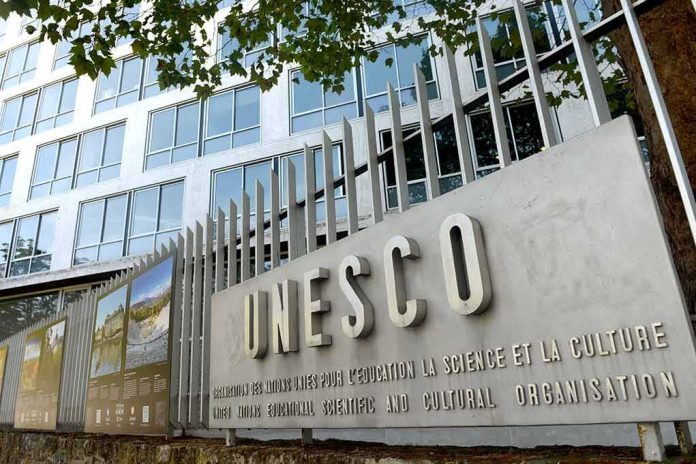
A new policy threatens to undermine multilateral collaboration by withdrawing the US from UNESCO, causing concern among international stakeholders.
Story Highlights
- The US announces its withdrawal from UNESCO, effective December 2026.
- Concerns include UNESCO’s divisive agendas and the admission of Palestine.
- The decision aligns with “America First” interests against globalist policies.
- US partners fear loss of influence and cooperation in science and culture.
US Announces UNESCO Withdrawal
On July 22, 2025, the Trump administration announced that the United States would withdraw from the United Nations Educational, Scientific and Cultural Organization (UNESCO), effective December 31, 2026. This decision marks the third major withdrawal by the US, following similar actions in 1984 and 2017. The administration cited UNESCO’s focus on divisive social and cultural causes and its inclusion of Palestine as a member, which the US views as fueling anti-Israel rhetoric.
UNESCO, founded in 1945 to promote international collaboration, faces another significant challenge with the US’s departure. Historically, the US has been a major funder and influencer within UNESCO, yet its repeated withdrawals have strained this relationship. Despite this, UNESCO has diversified its funding to mitigate the impact of US departures, reducing reliance on US contributions from 40% to about 8% of its budget.
Implications of the Withdrawal
The announcement has stirred reactions both domestically and internationally. US-based partners, including academic institutions and cultural organizations, express concern over losing influence and cooperation with UNESCO. The withdrawal is anticipated to disrupt US participation in World Heritage and educational initiatives, impacting science and cultural sectors significantly.
Internationally, UNESCO and UN leaders have expressed deep regret over the decision, emphasizing the importance of multilateral cooperation. UNESCO Director-General Audrey Azoulay stated that the move contradicts fundamental principles of multilateralism. The US administration, however, frames the withdrawal as necessary to protect national interests against perceived globalist and ideological agendas that undermine American sovereignty.
Long-term Consequences
In the long term, the US withdrawal could reduce its role in shaping global education, science, and cultural policy, weakening its soft power and international standing. While UNESCO has prepared for the financial implications, the loss of US expertise and participation in international projects may affect global efforts in science and education.
Moving forward, the decision reflects ongoing debates about the balance between national sovereignty and global cooperation. As the US remains a full member until the end of 2026, stakeholders are likely to continue discussions on how to maintain engagement with international organizations while protecting national interests.
Sources:
Nature (scientific community perspective)
“`




